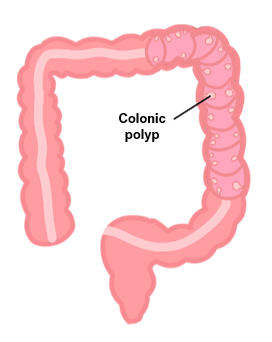Colorectal Cancer
This refers to a proliferation of cells arising from the colonic or rectal mucosa.
An elderly adult with iron deficiency anaemia is at high risk for colorectal cancer and should be investigated further, if clinically appropriate.
It can be sporadic, which is associated with random mutations in APC, but is also associated with a host of genetic syndromes.
Symptoms
These can present very insidiously so it is very important to screen for red flag symptoms:
Altered bowel habit
Tenesmus (urge but inability to defecate)
Vague abdominal pain
– Red flags symptoms – rectal bleeding, weight loss, abdominal mass, anaemia
Screening
Screening for polyps is performed on people aged 50–74 (different ages depending on the constituent home UK nation) every 2 years by the faecal immunochemical test
If positive, patients are referred for colonoscopy to investigate further
Key tests
Blood tests may show an iron-deficiency anaemia
Colonoscopy with biopsy is the diagnostic investigation
CT is used for staging – uses TNM staging (tumour, node, metastasis)
Raised tumour marker CEA, used for assessing treatment response and recur)
Management
Surgery to remove tumour +/- chemotherapy
There are several genetic syndromes which are associated with an increased risk of colorectal cancer:
Familial Adenomatous Polyposis (FAP)
This is an autosomal dominant disorder characterised by numerous pancolonic adenomatous polyps (rectum always involved).
It is due to inherited APC mutation (Chr 5q), which is a tumour suppressor gene and negatively regulates beta-catenin.
The mutation causes patients to develop colorectal carcinoma after puberty unless the colon is resected.
Therefore, in these patients, the colon and rectum are removed prophylactically.

Gardner syndrome
This leads to FAP as well as desmoid tumours (fibrous muscle tumours).
It is associated with mandibular osteomas (benign bone tumour) and thyroid cancer.
Turcots syndrome
This leads to FAP but it also gives tumours of the colon and CNS tumours (e.g. glial tumours)
Lynch Syndrome (Hereditary non-polyposis colorectal cancer)
This is an autosomal dominant condition which is the most common genetic cause of bowel cancer.
It is due to a mutation in DNA mismatch repair genes MSH2 and MLH1 which classically leads to right-sided colon tumours.
It is diagnosed by the Amsterdam criteria: at least three family members with colon cancer, across two generations and one person diagnosed before the age of 50.
It leads to increased risk of endometrial cancer and ovarian cancer.
Symptoms
Causes bowel cancer without polyp formation
Gives increased risk of endometrial cancer and ovarian cancer
Peutz-Jeghers syndrome
This is an autosomal dominant condition due to a mutation in the gene STK11 (on chromosome 19), which leads to benign harmatoma formation.
This gives an increased risk for colorectal, ovarian, breast and pancreatic cancers.
Symptoms
Multiple polyps in the GI tract with increased risk of malignancy and intussusception causing bowel obstruction
Also causes freckles (due to hyperpigmentation on the lips, mouth and genitalia)
Cowden syndrome
This is an autosomal dominant condition due to mutation in the PTEN gene.
The PTEN gene is a tumour suppressor which regulates the mTOR pathway involved in the cell cycle. The syndrome is characterised by benign hamartoma formation
Symptoms
Polyp formation in the bowel and thyroid adenomas
Characteristic trichilemmomas (skin lesions on face and hands)
Increased risk of endometrial and breast cancer

